Feature: 7 Best Africa Cup of Nations of All Time
By Robert Malit
Since 1957, the Africa Cup of Nations has offered joy, despair and drama. In the build up to the 2015 Africa Cup of Nations, Robert Malit recalls some of the greatest Africa Cup of Nations of all time, and explains just what made them so great.
1963: Kwame Nkrumah’s Real Republikans:
1963 served up the fourth edition of the Africa Cup of Nations. In a period characterized by African emancipation from colonial rule this tournament stood out as a representative of African renaissance. Ghana, making their debut, hosted and won the competition. The achievement had far reaching consequences; it inspired the rise of black African football and marked the start of the ever-present tension between football and politics on the continent.
Ghana’s national football team nickname, the Black Stars, was conferred on the team by President Kwame Nkrumah–himself deriving it from Jamaican Pan-Africanist Marcus Garvey. The Ghanaian leader, in his quest for a united Africa, used football to achieve his agenda and none more so than overseeing the development and subsequent success of the Ghana team. He tasked Ohene Djan, now the most celebrated football administrator in the country’s history, to form a precursor to the national team; Real Republikans. The team, whose name was inspired by the great Real Madrid side of the 60s, was composed of two of the best players from each of the teams in the Ghanaian league formed in 1958. The move, though unpopular, was justified by nationalistic rhetoric. Real Republikans would make up 10 of the starting eleven that clinched the Africa Cup of Nations title. Things started out well for the newly-formed Black Stars–holding Real Madrid to a 3-3 draw in Accra, a year before the tournament.
The tournament had been expanded to include 6 countries; Ghana, Ethiopia, United Arab Republic (a brief union between Egypt and Syria), Sudan, Nigeria and Tunisia. The sides were drawn into two groups of three where the winners would advance to the finals and the runners up clash for the third-place playoff. Ghana was coached by Nkrumah’s handpicked local coach, Charles Kumi Gyamfi, who was the first African to play in the German league (Fortuna Dusseldorf) and would later win three Africa Cup of Nations titles as a coach. He didn’t set his team for a resounding start in Group A as they could only draw 1-1 with Tunisia, Wilberforce Kwadwo Mfum becoming Ghana’s first goal-scorer at the Africa Cup of Nations. Nevertheless, The Black Stars announced their intents next by defeating defending champions Ethiopia by two goals to nil to sail into the final; Ethiopia would defeat Tunisia 4-2 two days later to confirm this. In Group B Egypt, under the United Arab Republic banner, was by far the more experienced side. Not only were they the oldest African national football team but they also already had two Africa Cup of Nations titles under their belt and had only just lost the preceding final. True to form, Egyptian great Hassan El-Shazly mirrored 1957 Africa Cup of Nations hero Mohammed Diab Al-Attar “Ad-Diba” by scoring four goals against Nigeria in a 6-3 drubbing. Nonetheless, Egypt would fail to reach the final for the first time- only managing to draw against a Sudan side who would later wallop Nigeria 4-0 to earn that place.
Egypt maintained their status as podium finishers by defeating Ethiopia, 3-0, but it was the final that all the attention would be drawn to. The hosts saved their barrage against Sudan for the second half; symbolically, their skipper Aggrey Fyn scoring the first goal from the spot after 62 minutes of play. Football myth in Ghana claims the country’s fear of penalties stem as far back as this game. The story goes that, another of this team’s heroes, Edward Acquah told his captain on the awarding of the penalty in Fante language, “Aren’t you afraid of taking Ghana’s penalty for me?” Acquah would etch his name in, more provable, Ghanaian football folklore by scoring two goals later on to earn Ghana her first title.
This Ghana team would pave the way for the country’s dominance of the Africa Cup of Nations in the 1960s- momentarily taking Egypt’s place as the leading light of African football. While Ghana would fizzle with the ousting of Kwame Nkrumah and the halting of his Real Republikan brain-child, the stage had been set for African football to rise. In Nkrumah’s words, “…ambassadors for Pan-Africanism and the new spirit of the African man.”
1994: Nigeria’s Finest Hour Amidst the Zambian Tragedy
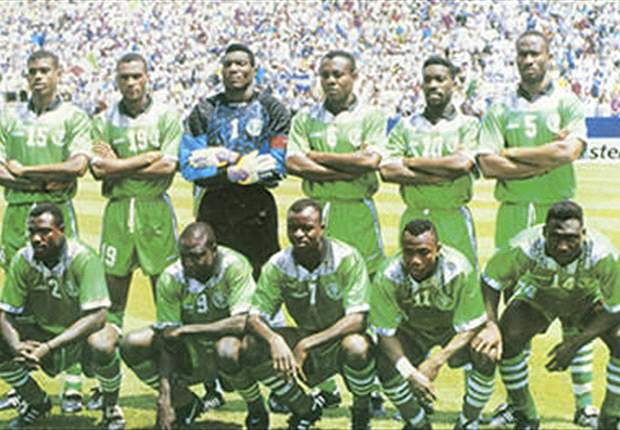
Hosts Tunisia were disappointing; they failed to get out of group A (there were four groups of three) and instead allowed an unfashionable Mali side to progress alongside the “Cinderella team” Zaire–really a side that evokes nostalgia. In group B, Egypt finished ahead of Nigeria but only via goal difference. Nigeria’s match against Gabon showed a team who had a date with destiny. They brushed aside Gabon by three goals to nil led by, the Africa Cup of Nations 3rd highest all time goalscorer, Rashidi Yekini, a man who sought retribution for the failure of 1992. It was the birth of Nigeria’s era of creativity; they dominated the game in controlled tempo, akin to the Bayern Munich side of the 1970s, choosing when to explode onto their opponents. In group C Zambia were quietly going through a resurrection; the side had been assembled around the most high profile survivor of the accident, Kalusha Bwalya, and wouldn’t raise many eyebrows until later.
Both group D qualifiers, Ghana and Senegal, were ousted in the quarterfinals in straight-forward circumstances with defending champions Ivory Coast sailing through alongside Zambia. Egypt also suffered a similar fate at the hands of Mali while the “Cinderella team” presented themselves as the next victims to Rashidi Yekini. The veteran striker notched yet another brace to match his tally from the previous tourney. This would mark the only time an Africa Cup of Nations held in North Africa failed to present a North African semi-finalist. Zambia who had improved gradually from their sloppy start sensed an opportunity to honor their fallen heroes and destroyed Mali 4-0 to romp into the finale.
Nigeria’s match against Ivory Coast was more complicated. It was a match between the defending champions and the established favorites. The Ivorians were without their main attacking threats, Abdoulaye Traore and Joel Tiehi; nevertheless it was a huge clash featuring Ivory Coast’s attacking style and Nigeria’s creativity style. The Elephants led the game twice but it was the legend Yekini who once again stood to be counted; he scored the second equalizer in a 2-2 draw and, perhaps fittingly, scored the winning penalty to ensure they went atleast one further than 1992.
The final divided conscience. On one hand was a most graceful African side in Nigeria, while on the other was Zambia, an embodiment of fight and hope amidst despair. Kalusha Bwalya only survived the accident because he had separate travel arrangements from the Netherlands, where he played for PSV Eindhoven, and had beaten the odds in leading Chipolopolo this far. The loss of the Zambian team was not only sad because of the loss of human life, 30 in total, but also because a very good team in the making was no more. For Nigeria this period marked the beginning of their reputation for churning out talents to Europe. Their German coach, Westerhof, had been partly responsible and built on the multiple successes Nigeria enjoyed at the FIFA U16 and, its successor, FIFA U17 World Cups. The Nigerian side, that would go as high as fifth on the FIFA rankings, was filled with stars; Yekini, Stephen Keshi, Jay-Jay Okocha, Sunday Oliseh, Finidi George, to name but a few. It was difficult to look beyond this.
In the game both teams scored early and Nigeria added onto this by scoring early in the second half as well- both goals by Zamalek legend Emmanuel Amuneke. The Zambians did not give in easily though; they dominated the rest of the second-half and Bwalya, himself, was only denied by the goalpost. There was no denying Nigeria though; their finest hour had arrived. The Super Eagles would proceed to make more history, becoming the first African team to lead a group at the World Cup on their debut in the competition.
1996: Post Invictus
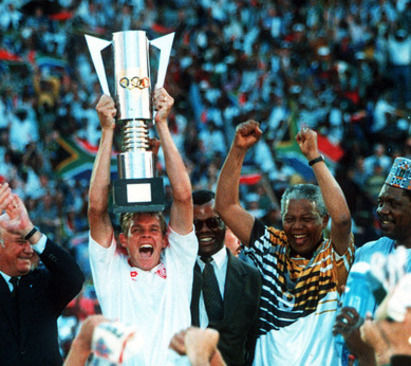
This was the first Africa Cup of Nations to take up the present day form of 16 teams in four groups. It was also the first time a win was worth three points in this competition. Unfortunately, the high riding defending champions, Nigeria, would not be part of this; they had withdrawn in the midst of political dispute between their country and hosts South Africa. So it was reduced to fifteen teams, but nonetheless, it would go on.
In group A South Africa started brightly, thrashing Cameroon 3-0 to the delight of 80,000 fans at what is now the FNB stadium. The other interesting story in this group was the clash between African football premier nations, Egypt and Cameroon, their rivalry still only sprouting. They had met thrice before, including the 1986 final which Egypt won on penalties. This time Cameroon won, 2-1, but Egypt would have the last laugh in accompanying South Africa to the quarter finals. Their two future Africa Cup of Nations legends, Ahmed Hassan and Rigobert Song, had now beecome initiated into the travails of continental football. Group C had been reduced to three teams after Nigeria’s withdrawal and the sides fancied their chances of making the last eight. All of Gabon, Zaire and Liberia won a match but George Weah couldn’t drag his side through. Ghana became the first team to win three games out of three in an Africa Cup of Nations group, cruising through group D led by household names like Abedi Pele and Anthony Yeboah.
The quarterfinals had their fair share of drama. South Africa, dramatically, overcame an Algerian side fasting during Ramadan; Mark Fish and John Moshoeu scoring either side of Lazizi’s goal. Zambia’s second half comeback edged out Egypt while an unassuming Tunisian side found themselves in the semifinals after a spot-kick victory over Gabon–making up for their embarrassing ousting as hosts two year earlier. In the semifinals Tunisia overcame Zambia in an entertaining clash in Durban that sadly did not enjoy the stand numbers it deserved. This had been a running theme in this competition (and a disease that plagues every other Africa Cup of Nations). Nevertheless, South Africa did not suffer from such issues; they had been backed by a raucous 80,000 crowd in each of their games in Johannesburg, far from the disinterested grounds of rugby strongholds. They now faced their biggest challenge yet in the tournament’s top ranked nation, Ghana. Even without the suspended Abedi Pele, surely they were more than a match for South Africa. But this was a 1995 redux; South Africa won 3-0 thanks to a brace from Moshoeu and goal from Shawn Bartlett. South Africa was in dreamland.
Now even the Rugby base, who had failed to reciprocate the support the year earlier, took note. For football lovers though, this was a culmination of events. Forget the rugby World Cup, Orlando Pirates had won the Champions League the previous year and it was going to be topped off by this. Embodying South Africa’s triumph over apartheid, Mark Williams, a “colored player” scored the two winning goals for “the sport of the blacks” in what is still South Africa’s greatest football-related achievement.
2002: Curtain Call On a Golden Era
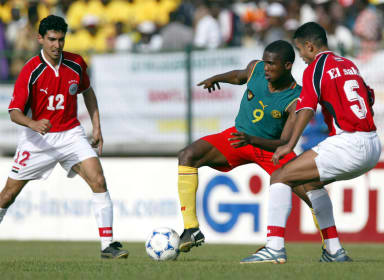
Like 1998, the 2002 Africa Cup of Nations was being hosted by a poor nation: Mali. Nonetheless, it proceeded smoothly as CAF expanded the reach of its golden goose. The dominant forces of the 1990s, Cameroon and Nigeria, were present as favorites; also present was Egypt, Africa’s most successful side, and a new force on the block in Senegal. The Teranga Lions had just made their first World Cup qualification and everyone was eager to see what Bruno Metsu’s side had in store.
Group A was the most entertaining group in what was a low scoring phase. It pitted the rhythm of Nigeria against the confidence of the Mali. In the end, the two qualifiers from this group, Mali and Nigeria, matched themselves even in a goalless draw but the former had to settle for second place. Group B represented those interesting groups that start slow but finish explosively as every team finds itself with a chance to proceed. It was explosive indeed. Morocco, who needed only avoid defeat, disintegrated spectacularly against South Africa and was knocked out. They could not regroup after, undeservingly, going down a goal at the break and had further misery added as they lost by 3 goals to one, Nomvete the hero for South Africa. Expectedly, Cameroon cruised past group C with a 100% record and awaited a stern test in the quarters.
In the last group, Egypt and Senegal renewed rivalries after Senegal had beat Egypt to a spot at the World Cup even though Pharaohs had beaten them. Their match was a tactical one but Senegal’s energetic style gave them the edge and they won by a solitary goal coming from a corner kick. This meant Egypt had to avoid defeat in their second game, against Tunisia, to avoid early elimination. A much improved Egypt showed up and won, courtesy of Hazem Emam.
In the last 8, South Africa who had been lucky to get this far were no match for Mali; who were now another testament of West Africa’s talents. Another of group B’s unimpressive sides, Ghana, was also dumped out; Lawal sending the ‘maestro’ Nigerians through. Senegal continued with their unmatched football style to see off DRC and now looked favourites for glory alongside Cameroon, who faced a familiar challenge. It was yet another matchup of Cameroon vs Egypt; never a disappointing game. Cameroon had been flawless in the group stage, winning all and conceding none, but they faced a team they knew all too well could take them down. There was no room for overconfidence against El Gohary, who was then and perhaps still is, the best African coach. But this Cameroon side was strong and it showed as they knocked out Egypt thanks to a Patrick Mboma’s header.
The Indomitable Lions were now in the semifinals having won all their games and were still yet to concede a goal. Their opponents, Mali, were not on par in terms of ability but had shown that they were confident and strong with their progress thus far. Moreover, Cameroon’s top scorer Patrick Mboma was absent so they felt their chances were better. Nevertheless, there was no stopping Schafer’s strong dominating side; this was the golden age of Cameroonian football. They easily beat Mali 3-0 in a one sided semifinal, Olembe’s brace picking up the slack in Mbola’s absence and the third a fabulous team move finished off by Marc-Vivien Foe. The other semifinal was more engaging; Senegal had Sarr sent off in the first half after Lawal’s theatrics. Still, they would score first (Dioup) only for Aghahowa to draw level late on. Now Senegal faced extra-time in the Sahelian heat with 10 men. Stunningly, Senegal scored early in extra-time and Nigeria could only implode as they finished with 9 men. Team work had beaten star power.
Despite Senegal’s aggressiveness, embodied by one El Hadji Diouf, they simply could not deny Cameroon. The match was decided on penalties, after ending goalless, and the Cameroonians edged it 3-2. For the first time since 1965 the Africa Cup of Nations had been defended by truly, until then, the most dominant winning side in the competition’s history.
2006; We Are Egypt
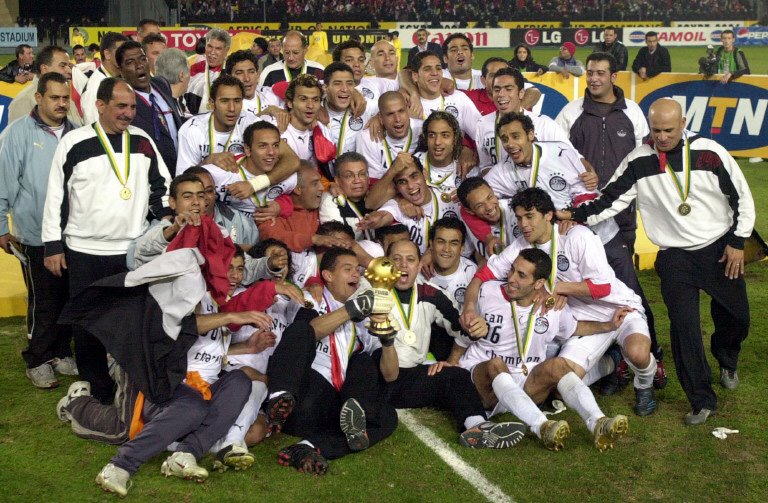
Egypt had appointed Hassan Shehata to improve Egypt’s football image after the 2004 Africa Cup of Nations failure but their World Cup drought continued. So this tournament grew in importance, and would also prove Egypt’s capability as a football nation after receiving no votes in their bid to host the 2006 World Cup. Their path wouldn’t be easy as they had to contend with Morocco and Ivory Coast in group A. In honesty, there wasn’t much confidence in this Egypt team but home advantage put them among the favorites.
They started well enough, easily defeating Libya by 3 goals to nil and all goals, including a spectacular free kick, came from their leading lights: Mido, the foreign based star, Aboutreika, the local hero, and Ahmed Hassan, the future team leader. There was an unmentioned feeling that Ivory Coast and Morocco would have to fight for the other sport. The former had replaced Nigeria as the African side that combined power and flair with their “galactico” team. For the latter, they enjoyed a talented team that twice came close to breaking the glass-ceiling; in the 2004 Africa Cup of Nations and the World Cup Qualifiers that followed. Unfortunately, they exited early without scoring a goal. In the final match day Egypt took full advantage of a weakened, already through, Ivorian team to win this group and secure an easier path to the last 4.
Group B was won by Cameroon, grabbing all 9 points on offer. Eto’o had been brilliant, scoring in all three games, including a hat-trick on match day 1 against Angola. Group C was turning out to be equally straight forward with Guinea and Tunisia winning their respective two opening matches. This left only the formality of deciding group winner but, in retrospect, Roger Lemerre made the mistake of fielding a weakened side and the defending champions lost 3-0 to finish an unwanted 2nd. Finally, in Group D, Nigeria, disappointed by missing out on a World Cup spot to Angola, looked for revival and indeed they found it in winning three out of three; Senegal, Ghana and Zimbabwe were no match. The Ghanaians were on course for a quarter final spot but got shocked by Zimbabwe to allow Senegal to sneak through via goal difference.
The Senegalese made most of their opportunity in a dramatic quarter final against Guinea. Senegal raced to a 3-1 lead with two of their goals coming late on but Pascal Feindouno pulled one back for his country with a superb strike, only too little too late. Egypt, on the other hand, had no issues in dispatching surprise quarter-finalists Democratic Republic of Congo (DRC), even witnessing the great veteran Hossam Hassan notch a goal. The other two quarter-finals had more evenly matched opponents and fittingly both were settled via spot-kicks. Nigeria avenged their penalties defeat to Tunisia two years earlier and sent the fancied defending champions packing. Meanwhile, Cameroon and Ivory Coast just fell short of equaling the record for most spotkicks taken after Eto’o embarrassing miss was responded to by Drogba’s finish. It ended a dramatic 12-11 on penalties.
In the semis, a lot was expected of the Ivory Coast-Nigeria match up but it was truly underwhelming, only settled by a Drogba strike. Once again, Nigeria proved to be only “near-men” as they continued their reputation of semifinal exits. For Egypt, Senegal would be their first real test of the competition but that is not what the match is famed for. The game was tightly balanced at 1-1, from a retaken Ahmed Hassan penalty and a Niang’ header when the Egyptian bench decided to sub off Mido; what ensued would forever become a part of Egyptian football folklore. The star striker, in disagreement with the decision, almost came to blows in a heated confrontation with his coach. Shehata was immediately vindicated as the substitute, Amr Zaki, scored what proved to be the winner with his first touch.
Therefore, Ivory Coast and Egypt met again; for the Pharaohs retribution was sought for missing out on the World Cup and Ivory Coast needed silverware to go with their reputation. The match itself was far from engaging, in fairness as are most finals, though there were moments to savor: Drogba’s miss, Egypt’s disallowed goal and Hassan’s agonizing penalty miss in extra time. Ivory Coast had been the better team in Cairo’s hostile atmosphere but their inability to find the decisive goal haunted them even in the penalty-shootouts. Feeling almost choreographed, akin to the tracksuit crowds of this tournament, El Hadary saved Drogba’s penalty and 7 kicks later Mohamed Aboutreika won a 5th title for Egypt. It was a reminder of who Egypt were and the start of something beautiful.
2008: Better Than the Rest
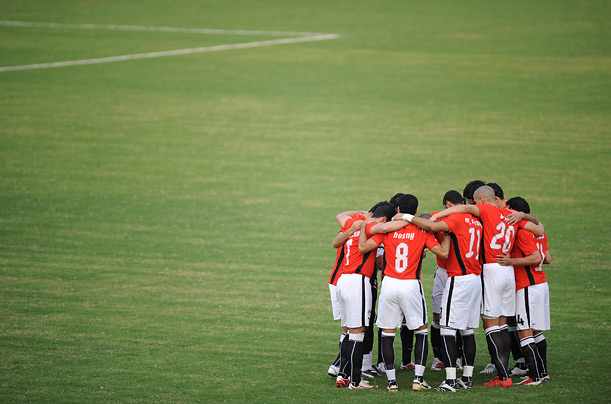
Pressure weighed on the hosts and it showed in the opening match as they needed a 90th minute goal from Muntari to beat Guinea who had been a match for them all through. Nevertheless, they would progress as expected on the back of solid wins. Morocco hoped to accompany them to salvage the fading respect they held in African football and it seemed this would happen in their 5-1 walloping of underdogs Namibia. Guinea, though, were no underdogs and the two sides ran each other rugged with the West Africans just prevailing with a 3-2 scoreline. In group B Ivory Coast and Nigeria opened the festivities with a bigwigs clash. There was little to separate the two sides till Salomon Kalou scored the decisive goal with great individual work. For their next games though, Ivory Coast found goals easy to come by such that they had 4 players on 3 goals at the end of the competition. As if a response to group B, group C served up Egypt vs Cameroon on matchday 1. The defending champions, surprisingly underrated due to a foreign-players fetish from pundits, issued a message to the rest of the field for by halftime they were 3 goals up. Now welcoming Abd Rabou and Mohammed Zidan, the Egyptians ability to rip open teams was irrepressible. The game finished off 4-2 setting the stage for Egypt to ease into the last 8. Cameroon did offer a response by thrashing Zambia but their reputation had taken a big hit. Group D was fairly balanced that in the end there was worry of a “biscotto” between Angola and Tunisia; it wouldn’t be necessary as Senegal and South Africa cancelled each other out to go home early.
The quarter finals began with West Africa’s premier rivalry, Nigeria vs Ghana. The two sides presented a true battle of West African sides; the burly Agogo sending his ten-man team through. The red card Ghana received, John Mensah, was cynical; he blatantly impeded Odemwingie from running through on goal. Their dream was still alive. Similarly too, so was Ivory Coast’s; they were involved in yet another goal fest as they drubbed Guinea 5-0 in an overly one-sided knockout match. Egypt would be the next test for this Ivorian steam train as they too put up a regal performance only without the goals. It was another characteristic game of smooth passes and swift movements from Egypt in seeing off Angola; scoring goals either side of Manucho’s flyer to finish it all in the first half. The last of the quarter finals featured two solid teams, Cameroon and Tunisia. Tunisia pulled themselves back from two goals down but, cruelly, fell again to the Indomitable Lions in extra time in a game that saw two brilliant freekicks from Ben Saada and Geremi Njitap.
Therefore, four teams remained; Egypt and the 3 West African powers (Ivory Coast having replaced Nigeria). The first semifinal was scrappy as it pit a team that relied on solidity and the crowd, Ghana, against a Cameroon side that relied on the personalities of Samuel Eto’o and their coach Otto Pfister. The Cameroonians prevailed by a solitary goal from N’kong; it was them that would get the chance for a fifth title. After that dour game, fans hoped Egypt-Ivory Coast would be a far cry from the final two years earlier and they were not disappointed. El Hadary was in inspired form, his brilliance leading Egypt to a 4-1 victory over the Ivorians- the new “near-men” of African football. Amr Zaki also etched himself in the annals of African football with more pizzazz than he could in the semifinals of 2006.
After one month, Egypt and Cameroon remained. On account of their earlier meeting only one would have been expected to make it this far but Cameroon had risen above the disappointment and grown from strength to strength. Eto’o was yet again topscorer but there was a new gem, Alexander Song. Egypt, on their part, had looked ahead of their time and they showed it. They had their engine in the best player of the tournament, Hosny Abd Rabou, an African great in El Hadary, an equal to West African strikers in the bulldozer Amr Zaki, the smiling assassin Mohamed Aboutreika and of course Mohammed Zidan. There wasn’t a repeat massacre in the final though. Pfister was more cautious but he could not prevent the inevitable. The ever dependable Rigobert Song failed to clear his line and Zidan wrestled the ball from him to set up Aboutreika, giving him two winning strikes in two Africa Cup of Nations.
2010; Three In a Row
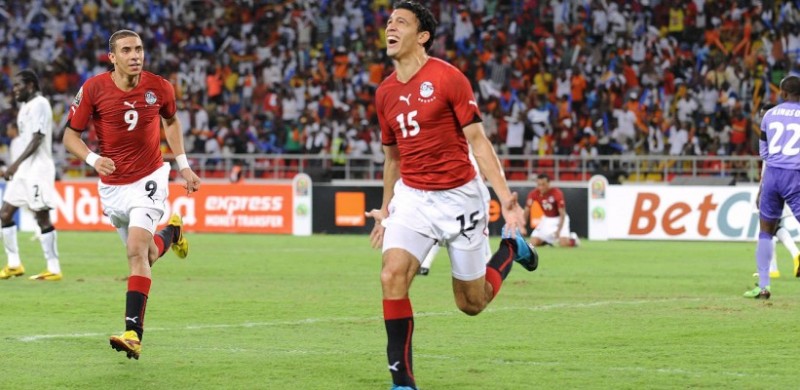
Manuel Jose had taken the reign in Angola, perhaps, hoping to extend his successes at club level with Al Ahly to international football. On the opening match, for 75 minutes it felt like he was on his way there. The Angolans had romped to a 4 goal lead against Mali and it was seemingly done and dusted; but Mali surprised all. Led by Seydou Keita, and his brace, the Malians unbelievably pulled level in those few minutes that remained to finish it 4-4. Unfortunately, that was all Mali presented as they exited early thanks to head to head inferiority against Algeria. The Algerians themselves had been on the receiving end of an embarrassing 3-0 defeat to minnows Malawi and only qualified on the back of a single win. Group B was reduced to 3 teams now that Togo were out but there was still thrill to see Ivory Coast up against Ghana; the new powerhouses of African football. In their clash, the Elephants lived up to their billing in comprehensively dominating Ghana in a 3-1 win despite being a man less. Egypt sought to win a historic three titles in arrow but another World Cup qualification failure (and Aboutreika’s absence) saw them, marginally, underrated against the starry West African sides; in their group it was Nigeria. This wouldn’t hinder them from getting maximum points including dispatching Nigeria by 3 goals to 1 in a come-from-behind-victory. In group D a tie breaker was needed after Zambia, Gabon and Cameroon all finished with four points; this meant ignoring results against Tunisia. Gabon thus got ousted despite their giant-killing act of defeating Cameroon.
Angolan and Manuel Jose’s dreams of becoming the 11th host champions were ended by Asamoah Gyan as a mish-mashed Ghana team returned to the last four. Such did not happen for Ivory Coast; they fell to an early extra-time goal by Bouazza after a frantic finish to regulation time. Keita had regained the lead for Halilodzic’s side in the 89th minute but Bougherra’s header in injury time countered this. Algeria won 3-2 and the tournament favourites were out. In the third quarter-final, the treat was a repeat of 2008’s final. Cameroon took the lead courtesy of Ahmed Hassan’s own goal but redemption soon presented itself for the captain with his long range strike that Kameni fumbled into the net. In extra time, Egypt scored quick successive goals to set up a clash against Algeria. First Gedo for the third time from the bench and then Hassan buried Cameroon with a contentious but well taken freekick to seal a 3-1 win. Nigeria couldn’t overcome Zambia, building itself up, and needed spot-kick luck to get back to their accustomed last 4 place. Indeed, that was as far as they would go as Gyan struck again to send Ghana to the final.
Their opponents would come from the match between rivals Algeria and Egypt. The Desert Foxes had denied their opponents a World Cup spot in Khartoum and the spillovers from that game had not been pleasant. Now Egypt, in the words of Zidan, sought to show the world which team was better. In the end it was not a contest. The Pharaohs romped to a 4-0 win with the ill-disciplined Algerian side disintegrating and finishing the game with 8 men; Halliche, Belhadj and Chaouchi were all sent off. It was typical Egypt; dominating, humiliating and toying with opponents now for a third straight Africa Cup of Nations.
The final then pit a young Ghanaian team that had lost players to injuries for the tournament against a battle-hardened Egypt to whom it seemed a third cup on the trot was formality. Ghana had played solidly, embodying their coach’s, Milovan Rajevac, idea of playing for results seen in the fact that all their wins had ended 1-0. As for Egypt, they had continued with their style of running and passing through teams. Even without Aboutreika, they were the top-scoring team. But as in the previous two finals, Egypt had been more calculating; this time a little pinned down by their Ghanaian opponents. There was no way through until Gedo, who had scored four times before, came on and curled past Kingston late on to win Egypt the title for keeps. There was more history made that night; Shehata equaled Gyamfi’s haul of three African Cup trophies and Egypt had set a record of 19 games without defeat at the tournament including 9 straight wins. The era and the soldiers of that era (El Hadary, Hany Said, Wael Gomaa, Ahmed Fathi and Emad Meteb played in all three finals) had reached their pinnacle. For Ahmed Hassan it was a glorious swansong: he was selected as player of the tournament and won a fourth Africa Cup of Nations winners medal.
Readers Comment
-
Murtala
11 years ago
You cannot talk about cup of nations without mentioning Senegal 1992.

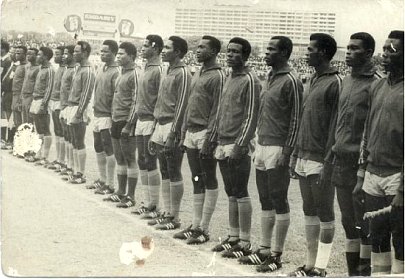
Comments
This article has 1 comment(s) , give your comment